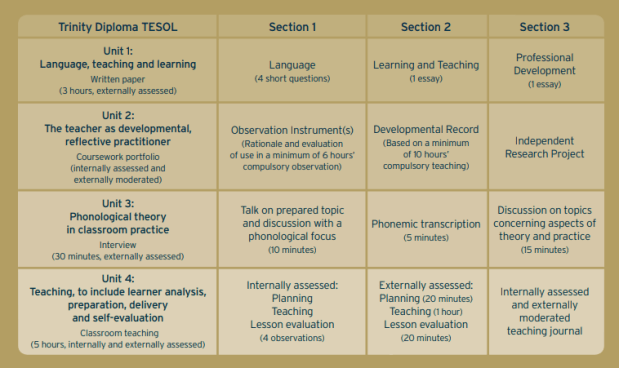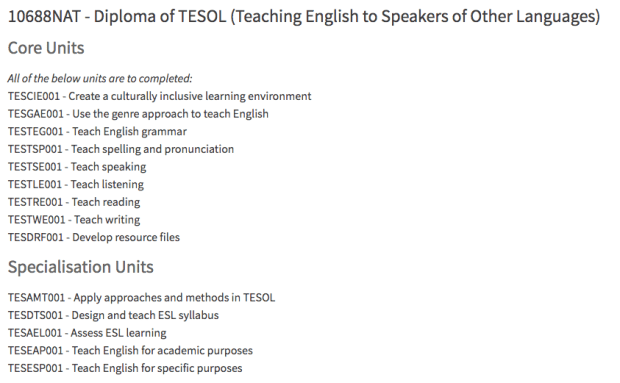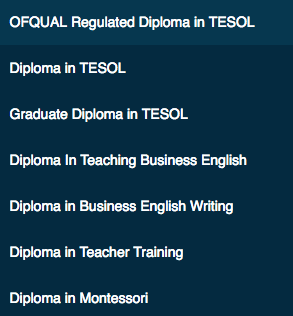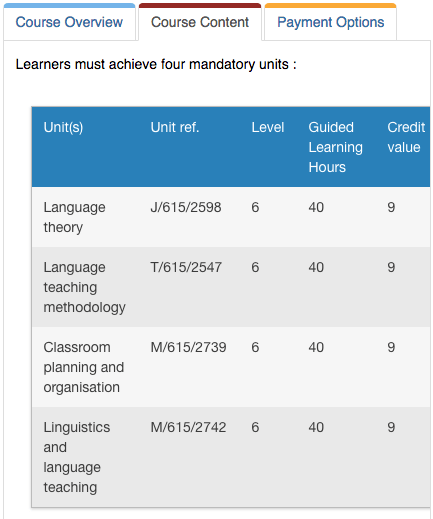The Pond.
In the world of ELT qualifications, the Cambridge Delta often takes the spotlight and it can be quite difficult to hear about any other diploma-level qualifications unless you go looking. This post aims to give you a brief overview of some of the other diploma-level qualifications available to English teachers, what the differences are and how to get more information. Firstly, we will look at the two ‘big fish’, Delta and DipTESOL, and then look at some other lesser-known ‘fish’.
The Big Fish – Delta vs. DipTESOL
Cambridge Delta.
If you’re reading my blog, then you probably know that I’ve completed Delta. And, you probably know that I have very positive feelings towards it. You can read more here if you like. That being said, I thought I would give a short summary of Delta here just so you can compare with the later options.
Summary:
- Number of modules: 3
- Time: Usually takes between 1.5 – 2.5 years – some integrated programmes are completed in 9 months (can also be done on an intensive course – 3 months)
- Price: Depends, however you are generally looking at about €3000 +
- Qualification level: 7 (60 credits)
- More information: The Cambridge Delta website.
- Useful blogs:
Trinity DipTESOL
The Trinity DipTESOL is perhaps the most well-known diploma-level qualification after the Cambridge Delta. Whereas the Delta is split into three modules, the DipTESOL is split into four. Something which really interests me about this course is Module 3 – Phonological theory in classroom practice. Phonology is something which I love, however am still not as confident as I want to be (even after taking Delta). Perhaps this is a reason to choose the DipTESOL over Delta? Perhaps not. It is certainly something that I would like to do in the future after I have completed my MA in TESOL. Here is an overview of the modules taken from the Trinity DipTESOL information leaflet.

Summary:
- Number of modules: 4
- Time: Generally 1 year (can be done on an intensive course – 3 months)
- Price: Around €2600
- Qualification level: 7 (60 credits)
- More information: Trinity DipTESOL website.
- Useful blogs:
- DIP TESOL Guide for students blog.
- Pete Clements’ ELT Planning.
The Other Fish.
LTi Diploma in TESOL
This is a relatively new Diploma and it is delivered mainly in Asia and Australia. The Diploma can be taken fully online, from what I gather, and seems to cover everything that the diploma should cover. Here is an overview of the course content:

Summary:
- Number of units: 14 units (from what I can see)
- Time: About 2.5 years
- Price: About $3000 (Aussie dollars)
- More information: The LTi website
Note: David Robertson from LTi has just informed me that they now operate in Tokyo and Osaka. More information can be found here.
INTESOL 390-Hour Diploma with Teaching Practice
INTESOL is a company that has been around since 1993 and provides a range of different training courses. The diploma that they have advertised covers all the expected content over 17 modules. There is the option to choose the diploma without teaching practice as well, although I’m not sure why you would do that. Looking around for reviews on the actual diploma course, I haven’t been able to find any. What’s more is that the school is accredited by ALAP, which is an independent accreditation organisation – not OFQUAL. That being said, the price is a lot cheaper than other diploma-level courses. I’ll see if I can dig deeper and find out more!
Summary:
- Number of modules: 17
- Time: Doesn’t say, however the title of the diploma states that it will take about 390 hours to complete. I imagine about a year or so.
- Price: £1000
- More information: The INTESOL Diploma website.
The London Teacher Training College OFQUAL-regulated Diploma in TESOL
This teacher training centre, much the same as INTESOL, has been around for about 30 years but hasn’t really broken into the market in terms of reputation. Well, at least I had never heard of it. That being said, they offer an OFQUAL-regulated Diploma which consists of 4 modules. Interestingly, they also offer other diplomas:

It makes me wonder about the differences between the different Diplomas advertised. Of course, OFQUAL is the official government accreditation body of the UK, so at least you can be reasonably sure that the course is up to scratch. Here is an overview of the course content:

Summary:
- Number of modules: 4
- Time: 372 hours – So I’m guessing about a year or more.
- Price: £1200
- Qualification level: 6 (36 credits) – So this is where this course differs from Delta and DipTESOL
- More information: LTTC website.
Final notes.
Within this great pond of ELT, there is a lot of BS. So, when choosing your provider for any course, not just diploma-level courses, choose carefully. You’re investing a lot of time AND money, so you need to be sure that at the end of that course you will have gained usable and up-to-date knowledge and a certificate that is recognised by employers. My advice is to do your research, speak to the providers, look at their accreditation and try to read some reviews from past candidates.
If you are reading this and work for or have studied with any of the mentioned providers and feel like telling me about your experience, please get in touch via the contact page. I’d love to hear your thoughts and will most definitely share them on this blog (with your permission of course).
Thanks for reading!
Jim


Thank you!
LikeLike
I’d very much like to know why the Delta diploma is always considered higher than all other Tesol diplomas. If you have other diplomas that supersede in completion hours such as 1,304 (which Delta doesn’t) then how could it possibly be superior? I see this all the time on the internet and have done multiple Tesol diplomas that consist of more work than Delta requires. It couldn’t be superior to a Trinity college LTCL/FTCL Could you please explain this to me? Thankyou.
LikeLike
Hi Pierre. I am unsure about many other ‘diploma’ courses as I have not taken them, but I do know that a number say diploma on the certificate, but it is not matched against any awarding body (as in the case with Delta and DipTesol). I also not sure one could say that the Delta takes x amount of hours as I feel it is different for every teacher and it also depends on the type of delta you do (full time vs part time). Personally I spent a lot more than 1000 hours studying, writing, preparing and reflecting on practice in the two and bit years that it took me to do mine, but that is me.
In terms of the courses you mention, I can only find mention of the FTCL for language teaching. This is very big undertaking it seems, but it does not (I should say didn’t as it does not run anymore) include assessed teaching practice (at least this is what is mentioned on the trinity website). In terms of this course and the delta, I would say the delta is better at developing practising teachers because of the assessed teaching practice. The delta also includes the M3 assignment which looks very similar to the FTCL.
But, returning to your point about ‘superiority’. I think Cambridge and Trinity run excellent diploma-level courses that are accredited, moderated and constantly reviewed for quality. I am not sure about other courses so I can’t comment and, that means, I am unsure if they are more superior or not. At the end of the day, if one takes on a course for development, one should be looking for quality and recognition. Cambridge and Trinity provide that and I unsure that other diploma courses do.
I am not sure if I have answered your question, but I hope I’ve made clear that it’s not a simple one.
LikeLike
Hello. I really truly appreciated your reply regarding the delta diploma. I see what you’re trying to say but for me it still leaves questions in my mind. I think it’s the way the diploma is portrayed. I know you can’t exactly match one against the other so you have to take it at face value to an extent. I’ve got a Tesol diploma that consists of 16 electives which allows you to teach in every single field of English that exists even legal English etc. The whole diploma if you did it would take at least up to 3 years to complete with its intensity. I won’t go on too much about that but advertising the Delta diploma as the equivalent of a masters degree is rather extreme I think. It’s likes saying a BA is the equivalent of a PHD. Well that’s how it comes across. So that’s my confusion in a nutshell for sure. It’s good to have someone to ask as it kind of trivialises the value of other highly sought after Tesol qualifications. To be honest it would be far better to have one required qualification for all teachers instead of hundreds to choose from at different levels on the internet. Thanks again.
LikeLike
Thanks for the pingback. This is a useful list, as the only alternative I knew about before was the DipTESOL.
LikeLiked by 1 person
Thanks, Sandy!
LikeLike
Hi Pierre,
I just wanted to add to what Jim has said about Delta a little.
Delta is considered by Ofqual, the UK qualifications body, to be at an equivalent level of study to a Masters course – they are both level 7 courses. That means that Delta goes into a similar level of depth. It doesn’t mean that you have a course the same ‘size’ as a Masters by the end of it. Ofqual deem it to be worth 60 credits, according to the Cambridge website: https://support.cambridgeenglish.org/hc/en-gb/articles/115004089423-Teaching-Qualifications-Recognition-FAQs A Masters course is usually 180 credits.
Part of the prestige of the Delta and DipTESOL courses comes from the fact that they have been accredited by bodies like Ofqual, who check how rigorous the qualification is, and that the content is at the intended level. I don’t know about other courses Jim has mentioned, but it may be that they have not been so rigorously checked by external bodies in the same kind of way.
As Jim said, another key feature of Delta/DipTESOL is the assessed teaching practice. For many people, this can be the most transformative part of the qualification, pushing you to go into depth with your learning and put into practice the theory you have been exposed to. As a recruiter, I would want to make sure anybody with a diploma-level qualification had been through this kind of teaching practice – a course which is a diploma in name, but which didn’t have TP, wouldn’t be as useful in preparing teachers to take on the observation required within more senior roles like training or managing, as far as I’m concerned.
One final thing to note is that the number of hours which a qualification requires is not directly related to the challenge/level of depth of the qualification. For example, a typical Bachelors degree is 3 or 4 years, whereas a Masters is 1 or 2 years, depending on which country you study it in. However, I don’t think anybody would deny that a Masters is the higher level qualification, despite being the shorter course.
I hope that helps,
Sandy
LikeLiked by 1 person
Thanks Jim. This is really an elaborative information about the options for those who are planning to do DELTA !
LikeLiked by 1 person
Always a pleasure, Sujata!
LikeLike
Hi Jim,
Thanks for posting about the LTi Diploma of TESOl I offer.
I have training centres in Bangkok, Manila, and Tokyo.
By the way, the Diploma of TESOL takes 90 weeks part time.
Enjoy your day,
David Robertson
LikeLiked by 1 person
No problems, David!
LikeLike